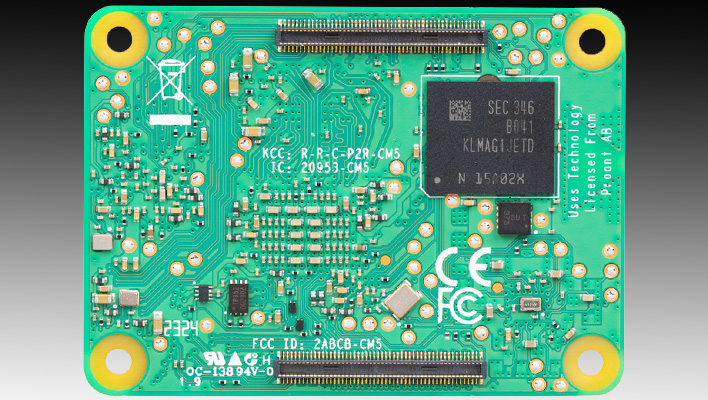It's been a little over four years since Raspberry Pi Foundation released a Compute Module. That changes today with the launch of Raspberry Pi's Compute Module 5, which is essentially a compact version of the Raspberry Pi 5 that trades an assortment of ports for a smaller design, making it a great candidate for embedded applications. And since it's based on the
flagship Raspberry Pi 5, the Compute Module 5 represents a nice leap in performance compared to its four-year-old predecessor.
It's powered by a 64-bit Arm Cortex-A76 quad-core processor clocked at 2.4GHz (versus a 1.5GHz quad-core Arm Cortex-A72 in the
Compute Module 4), with a VideoCore VII GPU supporting OpenGL ES 3.1 and Vulkan 1.3. Several memory options are available, including 2GB, 4GB, and 8GB of LPDDR4X-4267 from the get-go, with plans to offer a 16GB SKU sometime next year.
Tinkerers can also choose from various storage options, including 16GB, 32GB, or 64GB of onboard eMMC, or no storage at all. Additionally, the Compute Module 5 can be bought with or without wireless connectivity (dual-band 802.11ac Wi-Fi and Bluetooth 5.0).
"Compute Module 5 is mechanically compatible with its predecessor, Compute Module 4, exposing all signals through a pair of high-density perpendicular connectors, which attach to corresponding parts on the customer’s carrier board. Additional stability is provided by four M2.5 mounting holes arranged at the corners of the board," Raspberry Pi explains in a
blog post.
There are, however, a few changes to the pin-out and electrical behavior that are mostly related to the removal of a pair of dual-lane MIPI interfaces, and also the addition of two USB 3.0 interfaces. All of this (and much more) is detailed in a
datasheet (PDF).
Given that there are so many different SKUs available, pricing can vary widely, starting at $45 (2GB, no storage, no wireless module) and going up to $95 (8GB RAM, 64GB eMMC, wireless module included). Once the 16GB models drop, pricing at the top end will reach $135, according to
listings at PiShop.us
You can also find a few accessories, including an I/O board, a passive cooler, an I/O case, and a development kit.

